Year of the Ginkgo: Purpose
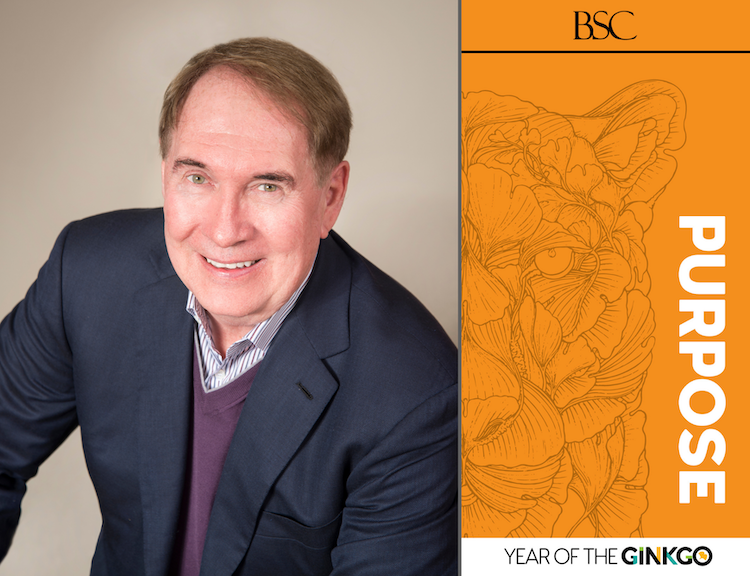
As BSC celebrates The Year of the Ginkgo – the 65th anniversary of the planting of our signature ginkgo trees – we’ve selected a word of the month that captures a key part of the BSC experience. September’s word is Purpose.
Ron Johnsey ’71 offered these thoughts on Purpose at our “100 Minutes on the Hilltop: 10 Speakers, 10 Minutes Each, 10 Big Ideas” event in 2018.
…
Are you living your purpose? And can your purpose carry on beyond your life?
Purpose. Do you have a purpose in your life? Have you ever thought about it? Does it excite you? Or does it scare you?
In the movie The Matrix, Agent Smith speaks about purpose. Without purpose, we would not exist. Purpose creates us, connects us, pulls us, guides us, defines us, drives us, and binds us. Purpose is really important to us.
So what is your purpose? We all want our lives to matter, to be significant, to have a purpose. Have you ever wondered what the world would be like if you didn’t exist?
In the Christmas classic It’s A Wonderful Life, George Bailey finds out. You see, George had big dreams, a big purpose. He wanted to leave his small town and accomplish big things. Instead, he spent his life helping the people of Bedford Falls. And believe it or not, over time, he came to believe that everyone would be better off if he had not been born.
In it, George is a distressed man on the verge of suicide. An angel named Clarence is sent from heaven to help George see what life would have been like in Bedford Falls if he never existed. In the end, George sees the positive impact he made because, time after time, he took action. He did what he knew was right.
Clarence tells him each man’s life touches so many other lives. George touched many lives in small ways and made a significant difference. He had indeed led a life of significance.
Now, everyone has the power to live a life of significance, regardless of your nationality, capacity, or your opportunity. All you have to do is make a difference with others, wherever you are with whatever you have, day by day, just as George Bailey did.
Back in 1995, I started my own company. I was 47 years old, married. I had three young children. Having my own company was a dream that I had since high school. But the truth is, the moment that the company was born, it was born out of desperation. I was unemployed. My purpose at that time was more about me, my family’s survival, not others.
I knew I’d be successful, and the company did grow. While I enjoy work, it was long and hard. It encompassed my entire life. There were no days off. There are deadlines to meet, presentations to make, papers to prepare. And I was doing this all over the country. It was consuming me. The concept of a work-life balance eluded me and – like one of my favorite songs by Jackson Browne, “Running on Empty” – I was running on, running on empty, running on, running blind.
This vice continued until 2010. Fifteen years of running. At this point, I was 62. It was the week before Christmas, and I was taking a late night flight to L.A. to give a presentation to a group of bankers early the next morning.
There was an older couple in the seats next to me, and the gentleman started up a conversation. I was working – you know everything is done at the last minute with me, it seems. So I didn’t want to talk. I really felt annoyed. But this guy persisted. And boy, I’m glad he did. He was a retired executive of a publicly-traded company, and he had led an incredibly successful life. Now he was trying to enjoy the fruits of his labor.
But as we talked, the conversation really got interesting when he asked me, “What happens to your company when you die?”
The question stunned me. I really had not thought about it. Honestly, I didn’t have an answer. My kids didn’t want it. I didn’t have an employee who could take it over.
Then this guy continues, “You do not have a real company if it cannot run without you.”
Well, there it was. Everything that I’d been working so hard for for 15 long years had no real value. It was scary. But on the other hand it became my turning point.
This is so simple, so logical. I had struggled for so long to get the company up and running those 15 years that I missed the bigger picture. The real purpose, the real significance.
Now while the company was gaining traction, there were times when I struggled to meet the payroll. I had my water and electricity turned off – your wife will be on your back at that point – and I had the IRS calling. Many people told me to quit.
“You can’t do this. It’s impossible. You’re not smart enough. You don’t have the resources you don’t have the skills. You don’t know the industry.”
However, I did not give up. I did not want to fail. I had a passion, a purpose, or so I thought. Reality quickly set in. Did I have only me to sell, or did I have a real asset, a company?
Turns out, I was the company. I had to control and do everything in the business, or at least have my fingers in every discussion and decision. Fear drove me, to the exclusion of everything else. Fear of failing; not providing; not delivering.
My motivator was fear, not purpose. All these years, I hadn’t had a purpose bigger than me.
Well, this guy continues. He won’t quit. He says, “How old are you?” I say, “62.”
Then he says “The clock is running out on you!”
So now this guy has told me my company is worthless, and I’m about to die.
But he gave me some great advice. He said, “Hire a young leader to run the company, and it would be a real company then, not Ron Johnsey, Incorporated.”
Yes, the clock was running out, and my engine was on empty. Truly.
Looking back, I believe God put that gentleman on my flight to have a life-changing conversation, to give me another chance to live a life of significance and purpose. I listened.
By 2012, I had hired a chief operating officer. And I was finally able to create a real company, a company that could had would run without me.
It was scary, but it was so invigorating. I gave up control. I empowered my employees. I wasn’t involved in every sales call or deliverable. Heck, I even quit signing checks – now that’s really scary.
As a company, we – the greater we – developed a higher purpose, and this energized us. It unified us. We created a big, hairy, audacious goal that we had for ourselves. We would inform every rental housing decision in the U.S. Just think about it. Any type of rental housing decision – buying, building, developing, renting, whatever – we would have some form of intelligence involved in it.
That, again, unified us, energized us, and the results were outstanding. We grew from 25 employees to over 150 employees in four years. Our revenues grew at a 45 percent rate each year. We became one of the top 100 companies to work for in Dallas. That’s a feat, let me tell you. And I was having a lot of fun.
It turns out that my fear of failing dissipated as I gave up control. And, more importantly, my personal purpose evolved, too. I focused on our employees helping develop their potential. I want them to live lives of significance and purpose. And I felt that we had done that.
Fortunately, unfortunately, we were so successful that in 2017 one of my public trading competitors made us an unbelievable offer. I visited with my leadership team and they said, “We’ve got to take it.” But I felt good. I felt like we were ready, and the whole team was ready.
With this journey, I was able to create and live a life of significance and to teach our 150 employees how to do the same. They learned about life. They learned about company culture, purpose and more. I knew they would be successful today and for decades to come.
Well, I’m the older gentleman in the airplane, striking up the conversation. Not that old. But my life has now come full circle.
My purpose has evolved again as I help others create and grow companies with a purpose bigger than their individual self. This is the real secret to success. Each of us has an opportunity to lead a life of significance, of purpose, of meaning. Take action.
If you don’t have a purpose, create one. What are you passionate about? What would you do if money was not an object? What kind of legacy do you want to leave?
Once you have your purpose, review it daily and live it. Don’t be afraid of shifts and changes. It will evolve. Mine did many times and it was always to the better.
So start today, and you can live a life of significance that will sustain you and will impact your family and friends, even generations to come.
…
Ronald Johnsey ‘71 of Dallas serves as managing member of Growth Destiny LLC, an operating entity that invests in early stage startups. Previously, he served for 22 years as founder and CEO of Axiometrics, Inc., the industry leading provider of apartment market data. After a successful exit to a publicly traded competitor in 2017, Johnsey has spent his time advising and helping entrepreneurs on their journeys to build culture-driven, purpose-minded entities that are both sustainable and valuable. With more than 50 years of experience with all aspects of commercial and residential properties in the United States, Johnsey has built, acquired, financed, and managed in excess of $1 billion in real estate. After receiving his B.A. from BSC, he earned an M.B.A. from Emory University and a J.D. from Cumberland School of Law. He currently serves as a member of the Executive Committee, Advisory Board, Chen Institute for Global Real Estate Finance, NYU Stern.
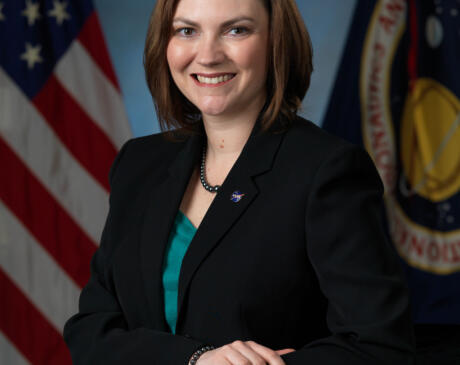
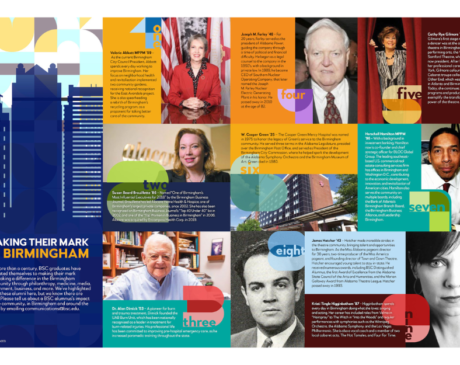
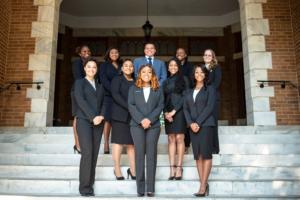
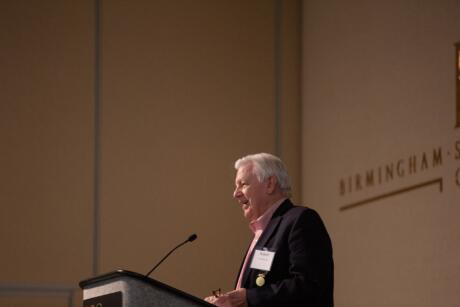
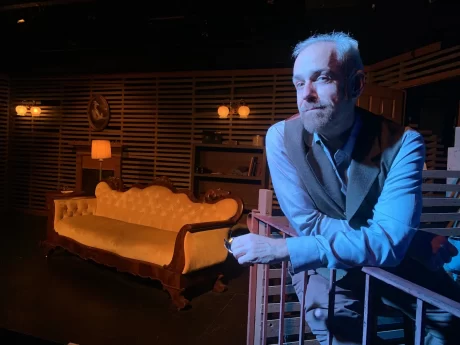
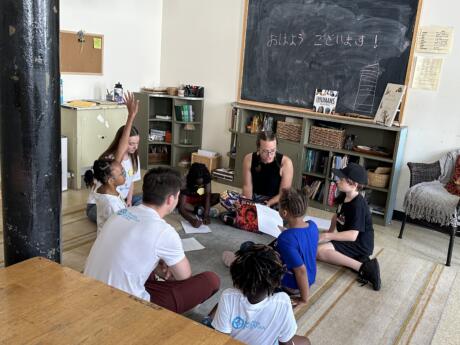


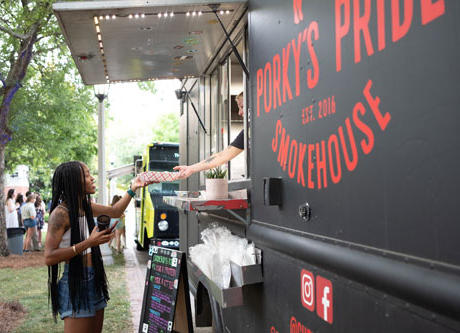
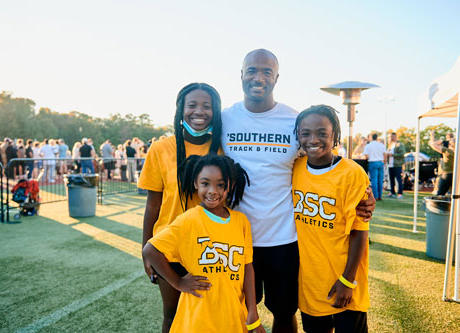
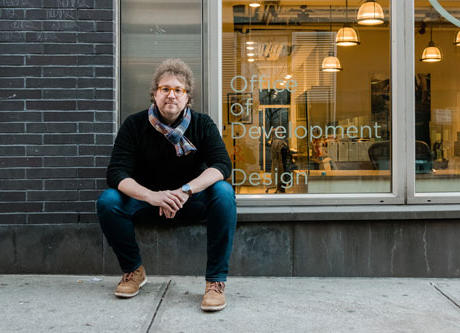
// Comments are closed //